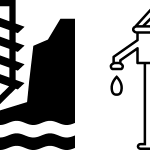Abdul Turay dug a well on his property in 2004, and in 2008 he obtained a hand pump to make water collection safer and more accessible. For many years the well never went dry. But recently, due to the global effects of climate change, the well has started going dry for a few months each year.
The 151 people living here used to be an isolated community, but they now live in the Suctarr neighborhood center. A few trees that have stood the test of time surround the community. The development has robbed this community of badly needed vegetation, which is essential in fighting climate change. People from all over the country and different tribes make up this community. This diversity creates a strong bond and intermarriage between tribes. There was a time when tribal tensions were high, but now that tension is slowly being wiped out.
The community benefits from its proximity to the only government hospital in the Chiefdom. Members of this community enjoy the privilege of knowing someone within the hospital since most staff live in the area. As a result, they can get treatment quickly when there is a need.
But an unreliable water source for this community means people here are more prone to waterborne diseases - leading to more hospital trips.
"We are now left with going to other communities to fetch water, and they will have us pay before we can fetch the water, and it is always more expensive than the monthly fee we are used to," said Aminata Gibo, a 38-year old mother.
"I normally have my children fetch water for the home very early in the morning or later in the afternoon, but since they now have to travel far from the house, they should fetch the water after school."
Mr. Turay dug the well as a goodwill gesture to serve the entire community. He has a daughter with a physical disability, and walking far distances is out of the question for her. When the well functioned all year, his daughter collected water right at home whenever she needed it. Now, however, she has to rely on her siblings and parents to help her with water.
The well is presently dry and poses a significant inconvenience for everyone who relies on this water source. The children in the community must travel to other areas in search of reliable sources of water. The water they cannot get in the morning can be made up in the afternoon immediately after they come home from school.
"Not having water in our community because the well has dried up causes a lot of problems because now I have to fetch water up until night time," explained teenager Victoria.
Here’s what we’re going to do about it:
Well Rehabilitation
The well marked for this overhaul is dry for a few months every year and needs major work to supply adequate, clean water to the community year-round. The pump will be removed, and a hand auger will be lowered inside and powered by a drill team. This hand auger will allow the team to drill several meters deeper to hit a sufficient water column to ensure the well supplies water throughout all seasons.
As the team drills, a casing will be installed, transforming the bottom of this hand-dug well into a borehole. PVC piping will connect this lower system directly to the pump, a construction that we know will also improve the quality of water.
Once this plan is implemented, everyone within the community will have access to safe drinking water in quality and quantity, even through the dry months.
Hygiene and Sanitation Training
There will be hygiene and sanitation training sessions offered for 3 days in a row.
After our visit, the hygiene and sanitation trainer decided it would be best to teach community members how to build a tippy tap (a handwashing station built with a jerrycan, string, and sticks). They will use these tippy taps for handwashing demonstrations and will also teach about other tools like dish racks and the importance of properly penning in animals.
This training will also strengthen the water user committee that manages and maintains this well. They enforce proper behavior and report to us whenever they need our help solving a serious problem, like a pump breakdown.






































